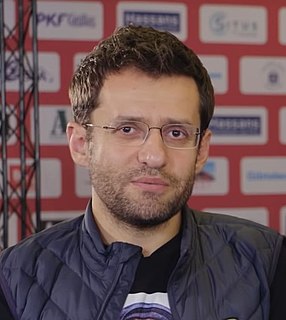A Quote by Hannu Rajaniemi
I'm not much of a chess player, but there is an aspect of the game that I find fascinating. After a while, you can almost see lines of force between the pieces. Areas of danger where it is physically impossible to move pieces into. Clouds of possibility, forbidden zones.
Related Quotes
Who's straight? I'm not. I am bent gouged pinched and tugged at, and squeezed into this funny shape. Each life is a game of chess that went to hell on the seventh move, and now the flukey play is cramped and slow, a dream of constraint and cross-purpose, with each move forced, all pieces pinned and skewered and zugzwanged... But here and there we see these figures who appear to run on the true lines, and they are terrible examples. They're rich, usually.
We are all part of a universal game. Returning to our essence while living in the world is the object of the game. The earth is the game board, and we are the pieces on the board. We move around and around until we remember who we really are, and then we can be taken off the board. At that point, we are no longer the game-piece, but the player; we've won the game.
In period pieces or genre pieces, those have to be set in historical truths. But, science fiction has different game pieces. And with those game pieces come other stories we're not familiar with. So, science fiction teaches us how to relate to outsiders, to foreigners, and to not approach any of that with fear, but a genuine curiosity.
Chess, which exists predominantly in two dimensions, is one of the world's most difficult games. Three-dimensional chess is an invitation to insanity. But human relationships, even of the simplest order, are like a kind of four-dimensional chess, a game whose pieces and positions change subtly and inexorably between moves, whose players stare dumbly while their powerful positions deteriorate into hopeless predicaments and while improbable combinations suddenly become inevitable. To make matters worse, some games are open to any number of players, and all sides are expected to win.
Life on a lifeboat isn't much of a life. It is like an end game in chess, a game with a few pieces. The elements couldn't be more simple, nor the stakes higher. Physically it is extraordinarily arduous, and morally it is killing...You get your happiness where you can. You reach a point where you're at the bottom of hell, yet you have your arms crossed and a smile on your face, and you feel you're the luckiest person on earth. Why? Because at your feet you have a tiny dead fish


































